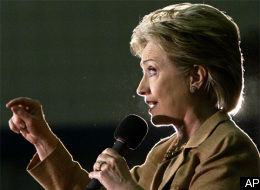
About Will Thomas
Will Thomas is an Associate News Editor and Political Reporter at the Huffington Post. Previously, he worked as a researcher for Talking Points Memo and TPMmuckraker. He lives in New York.Hillary Clinton's acknowledgment this weekend to ignore expert assessments of her gas tax suspension is a marked shift for a candidate known for her interest in policy minutiae. In fact, Clinton has complained about this kind of from-the-hip policy advocacy by the current administration throughout her campaign.
On Sunday, Clinton was asked to name a credible economist who supported her plan to suspend the federal gas tax during the summer months while taxing windfall profits of oil companies. Clinton decided against naming a supporting economist (a task which is admittedly difficult) and instead dismissed such expert advice as "elite opinion":
"We've been for the last seven years seeing a tremendous amount of government power and elite opinion behind policies that don't work well for the middle class... I'm not going to put my lot in with economists."
These comments come on the tail of arguments from her strategist Howard Wolfson:
"There are times that a president will take a position that a broad support of quote-unquote experts agree with. And there are times they will take a position that quote-unquote experts do not agree with."
But it wasn't so long ago that Clinton saw the economic policy, and the role of economic experts, in a very different light. Last month she had this to say about the housing crisis:
"So we need a president who can restore our confidence, a president who is ready to confront complex economic problems with comprehensive solutions, a president who will act at the first signs of trouble, working with experts to identify the problem, with agencies to adapt regulations, with Congress to pass necessary legislation, working to prevent crises rather than just reacting too little too late."
At that time, she recommended addressing the economic crisis by relying on the analysis of a team of economic experts.
"That's why I'm proposing an Emergency Working Group on Foreclosures. It could be led by a distinguished, non-partisan group of economic leaders like Alan Greenspan, Robert Rubin, Paul Volcker."
Indeed, failing to heed experts of all sorts has been one of Clinton's consistent attacks against President Bush. In a speech last August she referenced an executive order that gives political appointees the power to overrule agency experts. She took issue particularly over interferences in healthcare and global climate change.
"It should not take an act of Congress or an act of a Senator to get the President to listen to health experts on a matter of women's health."
"A lawyer previously employed by the American Petroleum Institute, [a political appointee] had no scientific background. Nonetheless, he insisted on editing scientific documents on climate change to cast doubt and greater uncertainty than the experts felt warranted."
Clinton feels so strongly about the threat from subverting the analysis of experts that she has promised to sign an executive order that, according to her website, "restores expert-driven, evidence-based agency decision-making":
Hillary will return to the longstanding practice of giving experts a central voice in agency rulemaking and will direct agencies to pursue evidence-based decisions.
And while her executive order applies directly to the Bush administration's attack on scientific research, Clinton has in the past held the same respect for economic leaders as she has for scientific experts. A few examples of her invoking the calculations of economic experts to develop policy:
"We now have lots of evidence from hard-headed economists that investing in early childhood makes sense."
"Economists estimate that every $1 billion spent on fixing crumbling infrastructure creates nearly 48,000 new jobs."
Of course, all candidates rely on the experience of experts. Clinton's campaign (like other candidates) continually emails reporters citing expert's praise for her myriad policies. She convenes military experts, economic planning experts and healthcare experts to appear with her at campaign events. In late December, her campaign even sent out a letter trumpeting support from over 200 foreign policy experts.
Indeed, there's a key question that remains unasked -- is there any other time, beyond this current gas tax flap, that Clinton has acted against what she saw as the expert consensus?



No comments:
Post a Comment